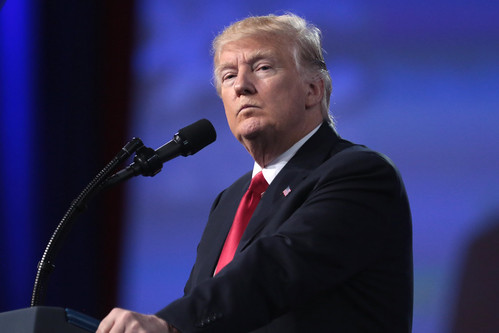From Truthdig
Exactly 17 months have passed since President Donald Trump precipitously withdrew from the Iran nuclear agreement, officially known as the Joint Comprehensive Program of Action, or JCPOA. Two and a half months later, on July 22, 2018, Secretary of State Mike Pompeo delivered a speech to a group of Iranian expatriates at the Ronald Reagan Presidential Library, in Simi Valley, California. "[T]he United States," Pompeo said, "is undertaking a diplomatic and financial pressure campaign to cut off the funds that the regime uses to enrich itself and support death and destruction." The crowd launched into generous applause, after which Pompeo delivered his main point. "We have an obligation to put maximum pressure on the regime's ability to generate and move money, and we will do so."
The Trump administration, Pompeo stated, would reimpose sanctions on Iran's banking and energy sectors. "[O]ur focus," he concluded, "is to work with countries importing Iranian crude oil to get imports as close to zero as possible by Nov. 4, [2018]. Zero."
The ostensible purpose of the "maximum pressure" campaign was to get Iran to withdraw from the JCPOA and return to the negotiating table, where a new, more restrictive agreement would be crafted that eliminated its nuclear enrichment program, curtailed its ballistic missile program and reduced its influence in the Persian Gulf. However, given Pompeo's embrace of the regime-change mantra of the Iranian expat community -- a sentiment he shared with Trump's then-national security adviser John Bolton -- the "maximum pressure" campaign could only be interpreted as an act of economic warfare against Iran, as prelude to an eventual military campaign designed to remove the Shi'a theocracy that has ruled the country since assuming power in 1979. Bolton himself emphasized this when he stated in November 2018 that "[i]t is our intention to squeeze them very hard. As the British say: 'Squeeze them until the pips squeak'."
In April 2019, the U.S. State Department announced it would not be extending any waivers that it had granted to several of Iran's key oil importers in an effort to ease the economic burden of being weaned off Iranian oil. "We are fulfilling our promise to get Iran's oil exports to zero and deny the regime the revenue it needs to fund terrorism and violent wars abroad," a State Department fact sheet noted. The State Department was particularly concerned about Iran's so-called "malign activities" in Lebanon in support of Hezbollah, in Syria in support of President Bashar al-Assad, and in Yemen in support of the Houthi rebels. The "maximum pressure" campaign was designed to starve these movements of Iranian financial support, thereby hastening the nation's demise.
For a year following Trump's May 8, 2018, exit from the JCPOA, Iran complied with its obligations under that agreement, adhering to every restriction while imploring the agreement's other parties to honor their commitments and ignore the newly reimposed U.S. economic sanctions. This proved increasingly difficult as the U.S. treated any nation or company that used the U.S. banking system to facilitate a transaction with Iran in violation of its terms. As a result, in May 2019, Iran began suspending its commitments under the JCPOA, something it (rightfully) claimed was permitted under the terms of the JCPOA in the case of noncompliance by a party to the agreement. (Iran claimed, with justification, that the EU was in noncompliance by failing to permit the unrestricted sale of Iranian oil to EU customers.) The U.S. responded by dispatching two B-52 bombers and an aircraft carrier battle-group to the region, an action Bolton claimed was intended to "send a clear and unmistakable message to the Iranian regime that any attack on United States interests or on those of our allies will be met with unrelenting force." By all appearances, it looked as if the U.S. campaign of "maximum pressure" was about to enter its final phase.
This is where the narrative gets interesting. Rather than retreat in the face of U.S. military pressure, Iran doubled down. Months before, in December 2018, Iranian President Hassan Rouhani had warned that "America should know that we are selling our oil and will continue to sell our oil and they are not able to stop our oil exports. If one day they want to prevent the export of Iran's oil, then no oil will be exported from the Persian Gulf." At the time, the Trump administration saw Rouhani's statement as empty bluster. It wasn't.
On May 12, 2019, four oil tankers, including two belonging to the National Shipping Company of Saudi Arabia, were attacked off the coast of the United Arab Emirates, at the entrance to the Strait of Hormuz. While no one claimed responsibility for the attacks, the U.S. was quick to blame Iran, which denied all responsibility. Oil prices jumped nearly 3% as a result. On June 13, two additional oil tankers were attacked while transiting the Strait of Hormuz; the U.S. claimed the vessels were attacked using limpet mines, while the crews claimed they were struck by projectiles. Again, the U.S. blamed Iran, and the Iranians denied all responsibility. Oil prices surged.
Whether or not Iran was involved, these attacks sent a clear signal to the oil-consuming world transit through the Strait of Hormuz, through which some 18.5 million barrels a day of crude and refined products pass, representing 20% of all oil produced globally, was not guaranteed. This point was reinforced when, on June 20, Iran shot down a U.S. Global Hawk drone it claimed had violated its airspace. The loss of the $130-million reconnaissance aircraft put the U.S. on war footing, with Bolton advocating a retaliatory air strike against Iran's air defenses and nuclear installations. The Pentagon cautioned Trump that any U.S. attack would likely result in a massive Iranian retaliation that would threaten the oil production infrastructure of Saudi Arabia, the United Arab Emirates and the other Gulf Arab states. Trump opted not to attack, avoiding a wider war, but in doing so left open the question as to the viability of U.S. military deterrence posture in the Persian Gulf. This turned out to be precisely the answer Iran was looking for.
Saudi Arabia had always been a major factor in the "maximum pressure" campaign against Iran. One of the foundational requirements for a successful U.S. effort targeting Iranian oil sales was for oil markets to remain well supplied and oil inventory levels to remain consistently strong. "We have commitments from oil-producing countries," the State Department noted in April 2019, "including the Kingdom of Saudi Arabia and the United Arab Emirates, to increase oil production to offset reductions in Iranian oil exports." On June 20, in the midst of the crisis over the downing of the U.S. drone, the special representative for Iran, Brian Hook, visited Saudi Arabia to discuss next steps. "We affirmed the Kingdom's support for the United States maximum pressure campaign on Iran," the Saudi Vice Minister of Defense, Khalid bin Salman, tweeted after the talks concluded, "which came as a result of continuing Iranian hostility and terrorism, and discussed the latest Iranian attacks on the Kingdom. Also discussed with the United States Special Representative for Iran the dangerous role that the Iranian regime plays in Yemen, where it neglects the humanitarian needs of the Yemeni people in favor of using the country as the main launchpad for its regional terrorism."
The ongoing war between Saudi Arabia and Houthi rebels in Yemen has been a sore point between the U.S. and Saudi Arabia, especially in the aftermath of the murder of Jamal Khashoggi, a Saudi journalist, by henchmen operating under the orders of Saudi Crown Prince Mohammed Bin Sultan. The humanitarian crisis that has befallen Yemen as a result of the invasion in 2015 has caught the attention of a U.S. Congress no longer willing to turn a blind eye to Saudi atrocities. In March 2019, Congress voted to suspend all U.S. military aid to Saudi Arabia's war effort in Yemen. While the measure was vetoed by Trump, the vote was a stinging rebuke to the Saudis, who had taken continuous and unobstructed U.S. military aid as a given.
But rhetoric alone does not win the day. The problem for the United States has been that its campaign of "maximum pressure" has had zero impact on Iran's so-called "malign activities" in the region. In July 2019, Iran test fired a ballistic missile with a range of more than 1,000 kilometers. A defiant Iranian spokesperson tweeted that "Iran's missiles are absolutely and under no condition negotiable with anyone or any country, period."
The Iranian missile test came amid a growing crisis between Iran and the United Kingdom over the tit-for-tat seizure of oil tankers. In early July, British Royal Marines boarded and took control of the Iranian oil tanker Grace 1, claiming that its load of oil was destined for Syria in violation of EU sanctions. Iran responded by boarding and seizing the British oil tanker, Stena Impero, as it navigated the Strait of Hormuz.
Complicating matters further was Iran's announcement in early July that it was suspending another JCPOA-imposed limitation on its nuclear program, breaching the 3.67% cap on the level of uranium enrichment allowed under the agreement. As the world debated Iran's suspension of JCPOA commitments, its ongoing tanker war with the U.K., and its testing of ballistic missiles, another front was opening that would test the U.S. "maximum pressure" campaign like no other.
The first rumblings of trouble came in May 2019, when the Saudis reported that Houthi drones operating out of Yemen had struck a strategic oil pipeline and two oil pumping stations, causing minor damage. "This is a message to Saudi Arabia: Stop your aggression," a Houthi spokesman declared afterward. "Our goal is to respond to the crimes they are committing every day against the Yemeni people."
(Note: You can view every article as one long page if you sign up as an Advocate Member, or higher).






